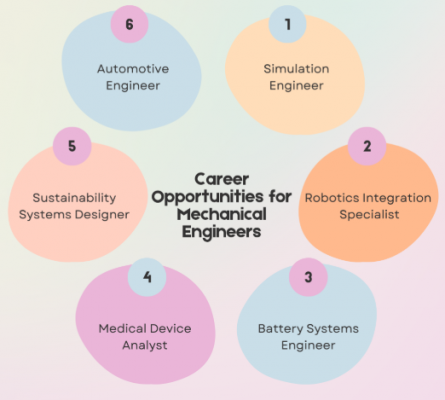Still Think Mechanical Engineers Only Work on Engines? Time for a Rethink

Blog / July 19, 2025
B.Tech. Mechanical EngineeringWhy a B.Tech. in Mechanical Engineering?Every tall building that stands, every metro that moves, every turbine that turns, mechanical engineering has a crucial role behind it. It’s the discipline that taught us how to build, move, cool, heat, and manufacture at scale. No part of modern industry exists without it.
Yet today, a quiet doubt is spreading. With AI, data science, and software in the spotlight, some say B.Tech. Mechanical Engineering is becoming outdated. That it no longer leads the future. Is that true? Or is it quietly evolving into something far smarter and broader than before? Let’s find out.

Why People Think Mechanical Engineering Is Losing Relevance
Mechanical engineering has powered every industrial revolution. But in the last decade, it’s lost some spotlight. Here's why the doubts are growing:
Outdated perceptions
- Many still think mechanical engineers only work with engines or factory machines.
- The digital boom made software seem like the only future-ready career.
Syllabus that didn’t keep up
- For years, some colleges stuck to the same old subjects.
- Students graduated knowing formulas but not tools like MATLAB, Ansys, or CAD automation.
Fewer visible roles
- IT jobs became more visible and better-paying early in careers.
- Mechanical roles often came with slower growth or long learning curves.
Job mismatch
- Many fresh graduates lacked the practical skills needed by modern industries, especially in smart manufacturing and data-driven design.
But here’s the thing: none of these mean the field is dying. What they mean is that it was due for a reset. And that reset is already happening.
How Mechanical Engineering is Merging with AI, Data, and Sustainability
Mechanical + Intelligence = A New Kind of Engineer
The best B.Tech. Mechanical Engineering programs today are not focused only on heat transfer or kinematics. They're teaching students how to combine design with algorithms, motion with machine learning, and hardware with human needs.
Let’s look at where this is already happening.
Smart Systems are the New Core
- Digital Twins: These are virtual models of physical machines. Companies use AI to simulate and improve mechanical parts before they’re made.
- Generative Design: AI helps engineers create hundreds of design options in minutes. This speeds up product development in automotive and aerospace.
Key B.Tech. Mechanical Engineering subjects now often include:
- CAD/CAE with AI plugins
- Simulation & automation tools
- Mechatronics
- Data acquisition and analysis
The expertise in these subjects makes B.Tech. Mechanical Engineering ready to lead and innovate in Industry 4.0.
Green Tech and Renewable Energy Are Driving Demand
Mechanical engineers are central to solving today’s biggest challenges: energy and climate.
So, where are they working now?
- Designing wind turbines and solar panels
- Improving battery systems for electric vehicles
- Building energy-efficient HVAC systems
- Creating lighter and recyclable materials for sustainable mobility
Mechanical engineers are shaping the clean energy transition: from hydrogen cells to waste heat recovery. They work on the design and optimisation of low-consumption, high-efficiency energy systems. They prioritise energy efficiency by choosing suitable materials, components, and layouts to reduce energy waste.
Robotics, IoT, and Industry 4.0
It’s not just about machines. It's about machines that think, adapt, and connect. Mechanical engineers now:
- Design robots that work alongside people in factories
- Use sensors and data for predictive maintenance
- Develop machines that self-correct using AI inputs
And they’re using tools like:
- Arduino, Raspberry Pi (for embedded systems)
- MATLAB and Simulink (for control design)
- SolidWorks and Fusion 360 (for smart product development)
Healthcare, Mobility, and Space are Now Core Fields
Mechanical engineers are driving new innovations in:
- Robotic surgery systems
- Prosthetic limbs with smart movement tracking
- Mars rovers and satellite deployment systems
All of this demands a new kind of engineer. One who still understands torque, stress, and materials, but also knows how to feed that data into software, test it digitally, and adapt designs in real time.
|
Old Thinking |
Modern Reality |
|
Just engines, machines, thermodynamics |
Robotics, AI design, automation, sustainable systems |
|
Limited to manufacturing or plants |
Also in space tech, health tech, smart mobility |
|
Static syllabus |
Dynamic courses with coding, simulation, and systems |
|
Isolated roles |
Interdisciplinary, team-driven, data-informed work |
How the B.Tech. Mechanical Engineering Syllabus is Evolving for Interdisciplinary Impact
If the job market is changing, the syllabus must too. And that’s exactly what’s happening.
Top institutions have begun rewriting the B.Tech. Mechanical Engineering syllabus to reflect what industries now demand, not what textbooks said ten years ago.
New B.Tech. Mechanical Engineering Subjects that Connect Fields
Today’s B.Tech. Mechanical Engineering subjects aren’t limited to thermodynamics and mechanics. They now include cross-disciplinary learning that mixes software, electronics, and data.
These are the additions most forward-thinking colleges now include:
- AI and Machine Learning for Engineers
- Robotics and Automation
- Smart Materials and Product Design
- Data Analysis and Visualisation
- Control Systems with MATLAB and Simulink
- Mechatronics and Embedded Systems
- Energy Storage Systems
These changes aren’t just about keeping the syllabus trendy. They reflect real demands from companies building the next generation of machines.
Industry Tools Now Taught in Class
Universities are not just teaching theory. Students now get hands-on experience with tools used by real engineers.
|
Tool/Software |
Application Area |
|
AutoCAD, SolidWorks |
Product and component design |
|
Ansys, Abaqus |
Structural and thermal simulations |
|
MATLAB, Simulink |
System modeling and control design |
|
Python |
Data analysis, automation tasks |
|
CATIA |
Aerospace and automobile design |
Projects and Labs That Match Industry Problems
Students today don’t just build a mini motor and call it done. They solve real engineering challenges. Some examples include:
- A project on EV braking systems using Arduino
- Simulation of wind turbine blade fatigue using Ansys
- A mini assembly line prototype with IoT sensors and
- Low-cost robotic arms for pick-and-place tasks
These projects blend design, coding, electronics, and testing, just like real jobs.
Internships and Industry Collaboration Are the New Norm
More universities now partner with companies for training. Students work on live projects or shadow engineers. This kind of exposure gives B.Tech. Mechanical Engineering students the context and confidence to work from day one.
The Expanding Horizon: Emerging Opportunities That Weren’t Possible a Decade Ago
With this updated B.Tech. Mechanical Engineering syllabus and a stronger skill base, engineers are entering new sectors, not just factories.
Here are roles that didn’t even exist a few years ago:
|
Role |
Industry |
Tools/Skills Needed |
|
Simulation Engineer |
Aerospace, Auto |
CFD, Ansys, FEA |
|
Robotics Integration Specialist |
Smart Manufacturing |
ROS, Python, PLC |
|
Battery Systems Engineer |
EV, Energy Storage |
Battery Modelling, MATLAB |
|
Medical Device Analyst |
Healthcare Technology |
Biomechanics, Design Tools |
|
Sustainability Systems Designer |
Green Buildings, HVAC |
Energy Modelling, IoT Sensors |
These are not just new titles. They reflect how B.Tech. Mechanical Engineering is becoming central to modern innovation.
Design, Build, Innovate: What Makes Shiv Nadar University (Institution of Eminence) Ideal for B.Tech. Mechanical Engineering
Rooted in engineering, aligned with innovation, built for tomorrow.
Mechanical engineering at Shiv Nadar University is not just about mastering machines; it's about shaping the systems that shape the world. Here, engineering isn’t taught in silos. It’s integrated with design, digital intelligence, and sustainability, preparing students to lead in industries where change is constant.
The School of Engineering at the university blends the classic knowledge of B.Tech. Mechanical Engineering with robotics, smart manufacturing, and computational design to shape future-ready engineers.
What makes Shiv Nadar University truly stand out is its collaborative ecosystem. Through industry partnerships, global exchanges, and innovation hubs, students get early exposure to the world they'll soon lead in.
If one is looking to pursue B.Tech. Mechanical Engineering in an environment that values depth, rigour, and relevance, Shiv Nadar University offers not just a course, but a launchpad.
Conclusion
Mechanical engineering isn’t stuck. It’s shifting. The field that once ran on engines now runs on data, control, and design thinking. The jobs that were once just about machines now include sustainability, automation, and innovation.
And the updated B.Tech. Mechanical Engineering syllabus reflects all of that, when taught right. It prepares one to design robotic systems, analyse simulations, work with clean energy solutions, and build smarter, safer products for real-world challenges.
One can’t ignore the changes. But one can choose to be part of them. This is a smart time to enter the field, not a risky one.
Apply to Shiv Nadar University and be part of a program built for the next generation of engineers, smarter, broader, and ready to shape what comes next.
FAQs
Is mechanical engineering still worth it in 2025 and beyond?
Yes. The field is expanding into EVs, robotics, renewable energy, and medtech: areas that need smart mechanical minds.
What’s new in the B.Tech. Mechanical Engineering syllabus?
Subjects like AI, mechatronics, energy systems, and automation tools are now included in most top programs.
Can mechanical engineers work in tech and AI?
Absolutely. Roles in digital manufacturing, simulation, and robotics now need coding and AI knowledge, layered on mechanical thinking.
What are the high-paying and high-impact roles for mech grads?
Simulation engineers, robotics designers, energy consultants, and automotive R&D roles are in demand and offer strong growth.
How can students prepare for mechanical + digital hybrid careers?
Focus on gaining skills in tools like MATLAB, Python, and SolidWorks. Work on interdisciplinary projects. Choose electives in AI or control systems.